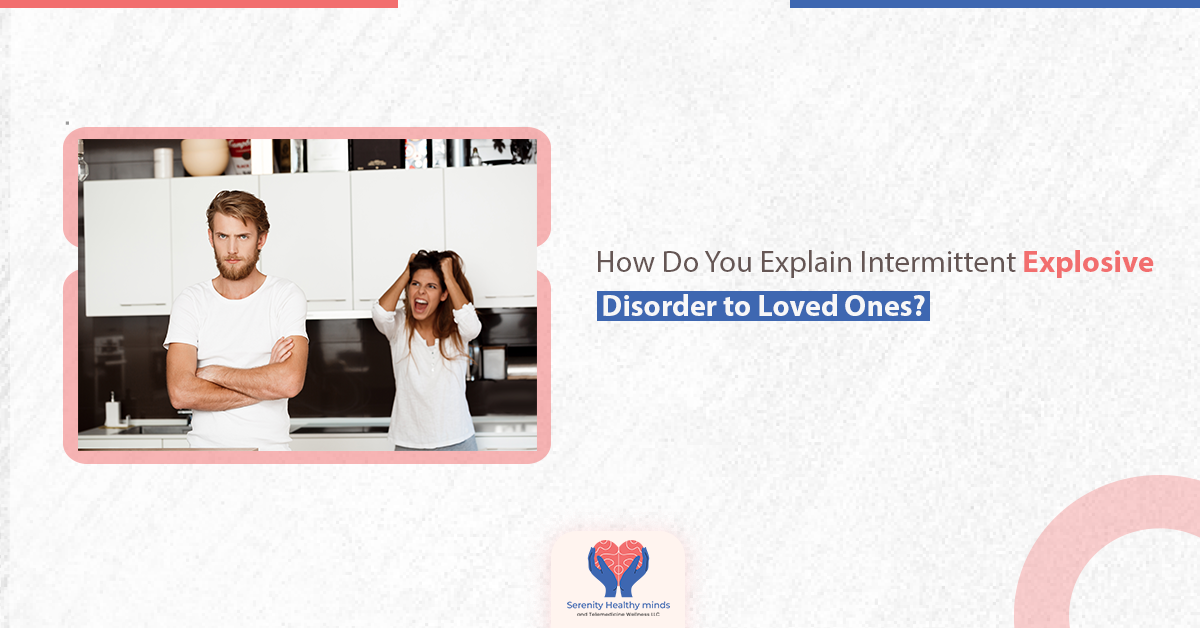Intermittent Explosive Disorder (IED) is when someone has very strong bursts of anger. The anger comes fast. It can seem bigger than the situation. The person may yell, break things, or act in a way that scares others. After the anger, the person may feel sorry, tired, or sad.
What Is Intermittent Explosive Disorder?
IED is not being mean on purpose. It is a health problem. The brain makes anger feel very big. The person cannot always stop the burst. These bursts can hurt feelings and break trust. IED is treatable. Many people get better with care.
Use Simple Words When You Talk
Pick calm words. Use short sentences. For example:
- “Sometimes your anger gets very big and fast.”
- “This is not your fault. It is a health problem.”
- “We aim to ensure you feel secure and relaxed.”
Say one idea at a time. Let the person answer. Listen without judging. Listening helps more than telling.
Use “I” Statements
When you talk, say how you feel. This keeps the talk kind and safe.
- “I felt scared when you shouted.”
- “I want us to be safe.”
- “I care about you.”
These words help the person hear you. They show love, not blame.
Give Simple Examples
Show what a burst looks like with easy examples:
- “When the light blinked, you broke a cup.”
- “When the phone rang, you shouted and then regretted it.”
Examples make it clearer. Keep them calm and true.
Talk About Triggers
Triggers are things that start the anger. It can be a sound, a thought, or a worry. Tell your loved one what you saw before a burst. Ask them if they notice a trigger, too. This helps you make a plan.
Short Calming Steps You Can Share
Teach small steps that work right away:
- Stop and breathe slowly five times.
- Count to ten.
- Walk away for a minute.
- Hold a cold cup of water.
- Squeeze a soft ball.
These steps are easy for kids and adults. Practice them together when calm.
Make a Safety Plan
A safety plan keeps everyone safe when anger is near:
- Pick a safe space to go for a few minutes.
- Have a phone number to call for help.
- Agree on a quiet signal if the person feels angry.
- Make a list of calming things the person likes.
Write the plan down. Keep a copy where everyone can see it.
Be Honest About Limits
It is okay to set limits. Say what you can and cannot do. For example:
- “I will not stay in the room if you throw things.”
- “I’ll reach out for help if someone gets hurt.”
Limits are loving. They keep people safe.
How We Can Help At Serenity Healthy Minds & Telemedicine Wellness LLC
We help people with strong anger. We do careful checks to learn what is happening. We offer medicine when it can help. We teach calm skills and ways to feel better. We also offer online visits for busy people through Telemedicine Wellness.
We do not provide emergency or walk-in crisis care. If there is a chance that someone could injure themselves or others right now, call local emergency services right away or go to the nearest emergency room.
Our care is kind and made for each person. We work with families. We help you make plans that fit your life. Contact us today.
When to Get Professional Help
Seek help if:
- Bursts of anger break things or hurt people.
- The person feels sad or guilty after bursts.
- Anger happens many times and stops daily life.
- You feel worried or unsafe.
Getting help early can make life calmer. Treatment can lower the angry bursts and help families heal.
Be Patient and Keep Love
Change takes time. Small wins matter. Celebrate calm minutes. Say thank you for trying. Say “I love you” often. Love and patience help people feel safe to change.
FAQs
Q. Is IED the same as being angry?
No. Everyone gets angry. IED is when anger is very big and happens a lot. It is a health problem.
Q. Can kids have IED?
Yes. Kids can have very strong anger, too. If you worry, ask a doctor or a mental health worker.
Q. Will medicine help?
Sometimes medicine helps. We look at each person and pick what may help best.




No comment